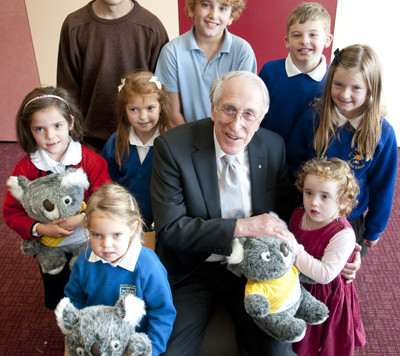Bionic ear inventor meets young cochlear patients at St George’s Hospital
On Wednesday morning children from across South West London and Surrey who have had their lives transformed by a cochlear implant, or bionic ear, got the chance to meet the device’s inventor Professor Graeme Clark at St George’s Hospital.
Professor Clark met several children and their families, including seven year old Amie Lundberg, the first patient to have the implant at St George’s, and her brother Jack, who had his second cochlear implant earlier this year, to find out how their lives have been changed since their operations.
A cochlear implant is an electronic medical device that replaces the function of the damaged inner ear. Unlike hearing aids, which make sounds louder, cochlear implants do the work of damaged parts of the inner ear (cochlea) to send sound signals to the brain.
Professor Clark was at St George’s Hospital to open a two day cochlear implant course for surgeons from across the UK and Europe. St George’s Hospital was chosen to host the course by Cochlear Europe as recognition for the great strides made by the St George’s Healthcare Cochlear Implant Programme, which has been running for four years and is the youngest in the country. Since the programme was established more than 60 procedures on children from south west London and Surrey have been performed at St George’s Hospital.
David Selvadurai, Consultant ENT Surgeon and Director of the Cochlear Implant Programme, said: “I am so thrilled Professor Clark is here at St George’s and that the children have had the opportunity to meet the man who’s life long work and brilliance has changed their lives. He is a truly inspirational man and both the children and staff will never forget today.”
Professor Clark said: “When I started as an ear doctor in the 1960s there was very little we could do for our patients. It has been a long journey to get to where we are today, but this is a wonderful. I always believed the implant would work, but I didn’t realise how well it would work; it’s has been the most wonderful surprise really. I still get tears in my eyes when I see what a difference a cochlear implant can make to someone.”
The children were all excited to meet Professor Clark.
Dominic Augood, aged 11, said: “It was great meeting the Professor, he is a nice man. I wanted to say thank you to him because without him my hearing would not have improved. I got my cochlear implant in 2007 and it has made a massive difference to me.
Amie Lundberg, the first child to have the cochlear implant at St George’ Hospital three years ago, is now seven years old. She said: “I am a special girl here because I was the first person to have the cochlear at the hospital when I was only 3 years old and I had a second side implant last year, I come to see Mr Selvadurai every year.
“I have really been looking forward to meeting the professor and it was nice telling him that I am getting on well. I like my peach cochlear implant and I put stickers on it, and it helps me to watch my favourite films like Cinderella.”
Professor Clark left St Georges to deliver the Lister Oration at the Royal College of Surgeons on Thursday night, which is one of the most prestigious awards available in surgery.
Notes to editors
- Mr David Selvadurai, Consultant ENT Surgeon and Director of the Cochlear Implant Programme, is available for interview.
- Photographs of Professor Graeme Clarke, Mr David Selvadurai, the St George’s Healthcare Cochlear Implant Team and children who have had a cochlear implant at St George’s Hospital are available on request.
- For more information, please contact contact the communications unit on 020 8725 5151 or emailcommunications@stgeorges.nhs.uk Outside working hours, please page us by calling St George’s 07659 146548 and leave a message for pager SG548.


